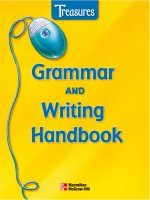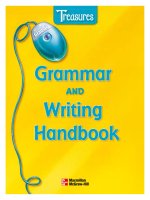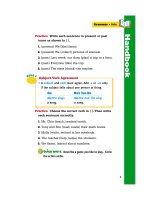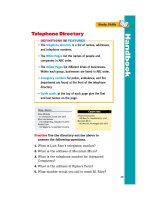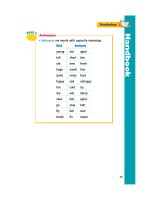treasures grammar and writing handbook grade 5 phần 10 doc
Bạn đang xem bản rút gọn của tài liệu. Xem và tải ngay bản đầy đủ của tài liệu tại đây (494.46 KB, 20 trang )
Build Skills
Spelling
• Homophones are words that sound the same but have different
spellings and meanings. Whole and hole are examples of
homophones.
ad currant heal mail threw
add current heel male through
aisle days herd main throne
I’ll daze heard mane thrown
isle
allowed dew higher missed to
aloud do hire mist too
two
base die hole pair toad
bass dye whole pear towed
boar find in peak wade
bore fined inn peek weighed
brake flew its rap wail
break flu it’s wrap whale
capital foul knew ring waist
Capitol fowl new wring waste
cell grate knot some weave
sell great not sum we’ve
chews hair lead stationary wrung
choose hare led stationery rung
coarse hall lessen their
course haul lesson there
they’re
Common Homophones
Word Study Steps
Be a better speller by following these steps.
1. Study each letter in the word.
2. Picture the word in your mind.
3. Write the word carefully.
4. Check the spelling of the word.
253
Correcting Sentence Fragments
Problem 1
A sentence fragment that does not have a subject
Sentence Fragment: Visited the gardens.
Solution 1
You need to add a subject to the sentence fragment to
make it a complete sentence.
Sentence: My class visited the gardens.
Who or what
visited the
gardens?
• A sentence is a group of words that expresses
a complete thought.
• A sentence fragment does not express
a complete thought.
Problem 2
A sentence fragment that does not have a predicate
Sentence Fragment: My teacher, Mrs. Santos.
Solution 2
You need to add a predicate to the sentence fragment
to make it a complete sentence.
Sentence: My teacher, Mrs. Santos, had never seen so many
beautiful flowers.
What about
your teacher,
Mrs. Santos?
254
Practice Rewrite the sentence fragments to make
complete sentences.
1. Decided to get out the map.
2. A big painted sign.
3. Walked down the path.
4. Next, Sam and I.
5. A beautiful smell in the air.
6. The rest of the class.
7. Followed the sounds of their voices.
8. Never caught up to the class.
9. Our teacher and all our classmates.
10. Had been looking for us everywhere.
Problem 3
A sentence fragment that does not have a subject and
a predicate.
Sentence Fragment: At the front gate.
Solution 3
Add a subject and a predicate to this fragment to make it
a complete sentence.
Sentence: The tour guides gave us a map at the front gate.
Who or what is
this about? What
did they do?
255
Correcting Run-on Sentences
Problem 1
Two sentences joined with no punctuation between them
Run-on Sentence: Everyone wrote a report my
report was about the desert.
Solution 1
Separate the two complete thoughts into two sentences, and add
the necessary capitalization and punctuation.
Sentences: Everyone wrote a report. My report was about
the desert.
Are these
two complete
thoughts?
•
A sentence is a group of words that expresses a
complete thought.
• A run-on sentence contains two or more sentences
that should stand alone.
Problem 2
Two sentences joined only by a comma
Run-on Sentence: The desert seems like an empty place,
many plants and animals live there.
Solution 2
Place a comma at the end of the first complete thought. Then add
and, but, or or to connect the two thoughts.
Compound Sentence: The desert seems like an empty place, but
many plants and animals live there.
Aren’t these
two different
sentences?
256
Problem 3
Three or more sentences joined with and, but, or or
Run-on Sentence: The desert has a harsh climate, and the
temperatures can be extreme,
and there is very little rain.
Solution 3
Create more than one sentence by separating ideas
and using correct end punctuation. Join two closely related ideas to
form a compound sentence.
Separate Sentences: The desert has a harsh climate. The
temperatures can be extreme, and
there is very little rain.
Does this
sentence include
three separate
thoughts connected
by and?
Practice Rewrite these run-on sentences correctly.
1. My family took a vacation last summer, and we went to the
desert, but we stayed cool in a hotel.
2. Our trip was to Santa Fe, it is the capital of New Mexico.
3. My family and I saw the sights we visited every museum
in town.
4. We enjoyed the shops, and my mother shopped for jewelry,
but my brother and I were more interested in the food.
5. I had fun, I learned a lot about New Mexico.
257
Confusing Plurals and Possessives
Problem 1
Using an apostrophe in a plural noun
Incorrect Plural Form: Two fifth-grade student’s
interviewed a new classmate.
• A plural noun names more than one person, place,
thing, or idea and usually ends in -s or -es.
• A possessive noun shows who or what owns or has
something.
• To form the possessive of most singular nouns, add an
apostrophe and an s (’s).
• To form the possessive of a plural noun that ends in -s, add
only an apostrophe (’). To form the possessive of a plural
noun not ending in -s, add an apostrophe and an s (’s).
Solution 1
Remove the apostrophe. Do not use an apostrophe
in a plural noun.
Correct Plural Form: Two fifth-grade students interviewed
a new classmate.
Problem 2
Leaving out an apostrophe in a singular possessive noun
Incorrect Possessive Form: The new students name was Kathryn.
Do the
students
have or own
anything?
Solution 2
Correct a singular possessive noun by adding an
apostrophe and an s (’s).
Correct Possessive Form: The new student’s name was Kathryn.
Doesn’t the
name belong to
the student?
258
Practice Rewrite each sentence correctly. Use the correct
plural or possessive form.
1. Kathryn enjoyed the classes’ at her new school.
2. It took a couple of days to learn her five teacher’s names.
3. Kathryns new bus driver seemed very nice.
4. She even met some girl’s on the bus.
5. One friends’ house was right next door to hers.
6. Amandas parents invited Kathryn to their house.
7. The familys’ dog had just had seven puppies.
8. Kathryn wrote letter’s to tell her friends about the puppies.
9. They wrote back, and Kathryn read the childrens’ notes.
10. She missed her friends’, but she liked her new home, too.
Problem 3
Putting the apostrophe in the wrong place in a plural
possessive noun
Incorrect Form: Kathryn knew all the student’s
names at her old school.
Solution 3
Correct a plural possessive that ends in -s by adding
an apostrophe after the s (s’). To correct a plural noun not ending in
-s, add an apostrophe and an s (’s).
Correct Form: Kathryn knew all the students’ names at her
old school.
Are we talking
about the names
of one student or of
many students?
259
Lack of Subject-Verb Agreement
Problem 1
Using a singular verb with a plural subject or a plural verb with a
singular subject
No Agreement: Sheila take piano lessons
on Mondays.
Solution 1
Change the plural verb to match the singular subject.
Subject-Verb Agreement: Sheila takes piano lessons
on Mondays.
Is the
subject singular
or plural? What
about the verb?
•
The subject and verb must agree in a sentence.
• The subject and verb agree when both are singular
or both are plural.
Problem 2
Using a singular verb with a compound subject joined by and
No Agreement: Jesse and Lee gives Sheila
piano lessons.
Solution 2
Change the singular verb to match the compound subject.
Subject-Verb Agreement: Jesse and Lee give Sheila
piano lessons.
Is this
subject plural or
singular? What
about the verb?
260
Problem 3
Using the wrong verb form with a compound subject joined by or
No Agreement: Tina or Marta help her in pottery class.
No Agreement: Her sister or her friends helps, too.
Solution 3
When a compound subject is made up of two subjects
joined by or, the verb agrees with the subject that is closer to it.
Subject-Verb Agreement: Tina or Marta helps her in
pottery class.
Subject-Verb Agreement: Her sister or her friends help, too.
Is Marta
singular or plural?
Is friends?
Practice Rewrite each sentence correctly so that all
subjects and verbs agree.
1. Dancing and skating is Sheila’s favorite activities.
2. She dance the best of all the students.
3. Larry or two other boys offers to be her skating partner.
4. Her friends asks to see the dance steps.
5. Her mother and teachers admires her talent.
261
Incorrect Verb Forms
Problem 1
Forming irregular verbs incorrectly
Incorrect Verb Form: Nick heared about a
poster contest.
• The past tense of a regular verb is formed by adding
-d or -ed.
• The past participle of a regular verb is formed by adding
-d or -ed.
• Irregular verbs have special forms that do not add -d or
-ed in the past or the past participle.
Problem 2
Using an incorrect irregular verb form for the past tense
Incorrect Verb Form: Nick drawn a design for
his poster.
Solution 2
Replace the past participle with the simple past-tense
form of the irregular verb. Past participles are used with a helping
verb such as have, has, or had.
Correct Verb Form: Nick drew a design for his poster.
What are
the verb forms
of draw? When is
each one used?
Solution 1
Replace the incorrect form of the irregular verb with the
correct irregular form. Check the dictionary if you are not sure of the
correct form.
Correct Verb Form: Nick heard about a poster contest.
What is the
past tense
of hear?
262
Problem 3
Using the incorrect irregular verb form with have
Incorrect Verb Form: His grandmother had gave
him a set of supplies.
Solution 3
Replace the past-tense form with the past participle.
Always use the past participle form of the verb after has, have, or had.
Correct Verb Form: His grandmother had given him a set
of supplies.
What form of
give do you use
with the helping
word had?
Practice Rewrite the sentences correctly. Use the correct
verb forms.
1. Nick drawed his poster on the computer.
2. He run into a small problem with the lettering.
3. He taked the picture to his computer teacher for help.
4. She seen a way to correct it.
5. Nick knowed exactly what to do.
6. He finished the poster and written his name on the back.
7. He was sure he had did his best work.
8. He brung his poster to the teacher.
9. She has sended it in to the contest.
10. She has saw many students win in contests like these.
263
Incorrect Use of Adjectives
That Compare
Problem 1
Using -er or -est instead of more or most
Incorrect Form: Teisha wanted this project to be
creativer than her last one.
Solution 1
To compare adjectives of more than two syllables, use
more or most. Remove the -er and use more before the adjective.
Correct Form: Teisha wanted this project to be more creative
than her last one.
How do you
make comparisons
with a long adjective
such as creative?
•
Add -er or more to adjectives to compare two nouns.
• Add -est or most to adjectives to compare three or more
nouns.
• Do not use more and -er at the same time, and do not
use most and -est at the same time.
Problem 2
Using -er or -est with more or most
Incorrect Form: She thinks that the Internet is
the most quickest way to
get information.
Solution 2
With shorter adjectives, add -er or -est to compare
people, places, or things. Never use more or most with -er or -est.
Correct Form: She thinks that the Internet is the quickest way to
get information.
Should you use
most and -est when
comparing with the
adjective quick?
264
Problem 3
Using the incorrect form when comparing with good or bad
Incorrect Form: She was sure her report would be
the goodest in the class.
Solution 3
The comparative forms of good and bad are better and worse. The
superlative forms of good and bad are best and worst. Rewrite this
sentence by using best instead of goodest.
Correct Form: She was sure her report would be the best
in the class.
Practice Rewrite the sentences correctly. Use the correct
form of adjectives that compare.
1. As Teisha worked, she came up with the most greatest idea.
2. She found a gooder source of information than she had
before.
3. She interviewed a person who was ten years more older
than Teisha.
4. Then Teisha added photographs to make her project
interestinger.
5. Everyone thought that Teisha’s project was more better
than her last one.
What are the
comparative
forms of good?
265
Incorrect Use of Pronouns
Problem 1
Using a pronoun that does not match the noun to which it refers
Pronoun Does Not Match: Mary Beth likes inventions, so she
chose to write about him.
Solution 1
Replace the incorrect pronoun with a pronoun that
clearly matches the noun to which it refers.
Pronoun Match: Mary Beth likes inventions, so she chose to
write about them.
To which
noun does
him refer?
•
A pronoun is a word that can take the place of one or
more nouns.
• Use a subject pronoun when the pronoun is the subject
of a sentence.
• Use an object pronoun when the pronoun is the object
of a verb or the object of a preposition.
Problem 2
Using an object pronoun as the subject of a sentence
Incorrect Pronoun: Them are photographs of
her grandfather.
Solution 2
Replace an object pronoun that appears as the
subject of a sentence with a subject pronoun.
Subject pronouns are I, you, he, she, it, we, or they.
Correct Pronoun: They are photographs of her grandfather.
Should the
pronoun Them
be used as the
subject?
266
Practice Write each sentence. Use the correct pronoun in
parentheses.
1. Grandpa invited (us, we) to come for a visit.
2. (We, Us) came over the next day.
3. Grandpa and (I, me) got out his old photo albums.
4. (He, Him) smiled as he turned each of the pages.
5. Dina asked (he, him) to talk about his early inventions.
6. He had invented a car, and (it, she) had won an award.
7. My brothers came over, and they showed Grandpa and (we,
us) their latest invention.
8. Grandpa’s cars didn’t run on gas. (They, Them) ran on
electricity.
9. We and (he, him) definitely have something in common.
10. We’re interested in inventions since (they, it) improve
the world.
Problem 3
Using a subject pronoun as an object in a sentence
Incorrect Pronoun: Grandfather showed Dina and I
pictures of his inventions.
Solution 3
Use an object pronoun when the pronoun is the object of a verb.
Object pronouns include me, you, him, her, it, us, and them.
Correct Pronoun: Grandfather showed Dina and me pictures of
his inventions.
Is I being
used in the sub-
ject part, or is I be-
ing used in the
predicate part?
267
Apostrophes
Problem 1
Leaving out the apostrophe in a contraction
Incorrect Form: Burt couldnt sleep because he
heard a strange noise.
Solution 1
Place an apostrophe in a contraction to show
where a letter or letters have been left out of the contraction.
Correct Form: Burt couldn’t sleep because he heard a
strange noise.
What is the
contraction? What
letters have been
left out?
•
An apostrophe is used in possessive nouns to show
ownership.
• An apostrophe is used to show where a letter or letters
have been left out of a contraction.
• An apostrophe is not used in a possessive pronoun.
Problem 2
Using an apostrophe with a possessive pronoun
Incorrect Form: Burt had no flashlight, so his sister
let him use her’s.
Solution 2
Remove the apostrophe. The possessive pronouns my,
mine, your, yours, his, her, hers, its, our, ours, their, and theirs do
not contain apostrophes.
Correct Form: Burt had no flashlight, so his sister let him
use hers.
Is her’
s
a
contraction? Is it
a noun showing
ownership?
268
Practice Rewrite the sentences. Use apostrophes correctly.
1. His dad said, “It’s you’re turn to call the Animal Rescue
Department.”
2. Burt quickly agreed and said, “Ill make the call
immediately.”
3. He talked to a worker and explained that he didnt have
a trap.
4. The man asked Burt if he wanted to borrow their’s.
5. “Yes,” said Burt. “Now, heres how you get to our location.”
6. The rescue team arrived and said, “Lets put food in this
cage.”
7. Then they quickly propped open it’s door.
8. Once the animal reached the food, it wasnt able to escape.
9. “Hes going to be a lot happier in his new home,” Burt said.
10. “Your a great friend to animals,” the workers told Burt.
Problem 3
Confusing contractions and possessive pronouns
Incorrect Word: He saw an animal, and it’s eyes
were shining.
Solution 3
Replace the contraction it’s with the possessive pronoun its.
Possessive pronouns do not have apostrophes.
Correct Word: He saw an animal, and its eyes were shining.
Should it be
it’s eyes or its
eyes? Is the pronoun
a contraction or a
possessive?
269
Incorrect Use of Adverbs
Problem 1
Confusing adjectives and adverbs
Incorrect Form: We acted helpful toward
the dancers.
Solution 1
Replace the adjective helpful with the correct adverb.
Use an adjective only when describing a noun.
Correct Form: We acted helpfully toward the dancers.
Is the word
helpful telling
more about a
noun or a verb?
•
An adverb is a word that tells more about a verb, an
adjective, or another adverb.
• An adverb can tell how, when, or where an action
takes place.
Problem 2
Using good instead of well
Incorrect Form: I don’t think I dance very good.
Solution 2
Replace good with well. Good is always an adjective.
Well is usually an adverb.
Correct Form: I don’t think I dance very well.
Is good
supposed to be
used as an adjective
or an adverb?
270
Practice Rewrite each sentence correctly.
1. The class was fun, and she finished it easy.
2. She didn’t know nothing about the program.
3. She and Justin danced good together.
4. She said she had never met no one as talented.
5. The audience clapped loud at the end of the performance.
Problem 3
Using double negatives
Incorrect Form: I didn’t know no one in the
dance class.
Solution 3
Do not use two negatives in one sentence. Replace one of the
negative words with a positive word.
Correct Form: I didn’t know anyone in the dance class.
Are there two
negatives in this
sentence?
271
Commas
• Use a comma to separate items in a series.
• Use a comma after a mild interjection.
• Use a comma after a long introductory prepositional
phrase.
• Use a comma after an introductory word such as yes or no.
Problem 1
Using commas incorrectly
Incorrect Form: I brought a tape recorder a pencil and a notebook.
Incorrect Form: After the basketball game we planned a trip.
Incorrect Form: Well what will you be reporting on next?
Incorrect Form: Yes you should do that story.
Solution 1
Insert commas between items in a series, after introductory preposi-
tional phrases, after mild interjections, and after introductory words.
Correct Form: I brought a tape recorder, a pencil, and a notebook.
Correct Form: After the basketball game, we planned a trip.
Correct Form: Well, what will you be reporting on next?
Correct Form: Yes, you should do that story.
Are there items
in a series? Is there
an introductory
phrase? Is there an
interjection?
Practice Rewrite the sentences. Use commas correctly.
1. I learned to use a computer a camera and a tape recorder.
2. On the desk in front you will find your supplies.
3. No we forgot to take pictures during the class trip.
4. Gee it was a lot of hard work.
5. During the summer this job was much easier.
272
